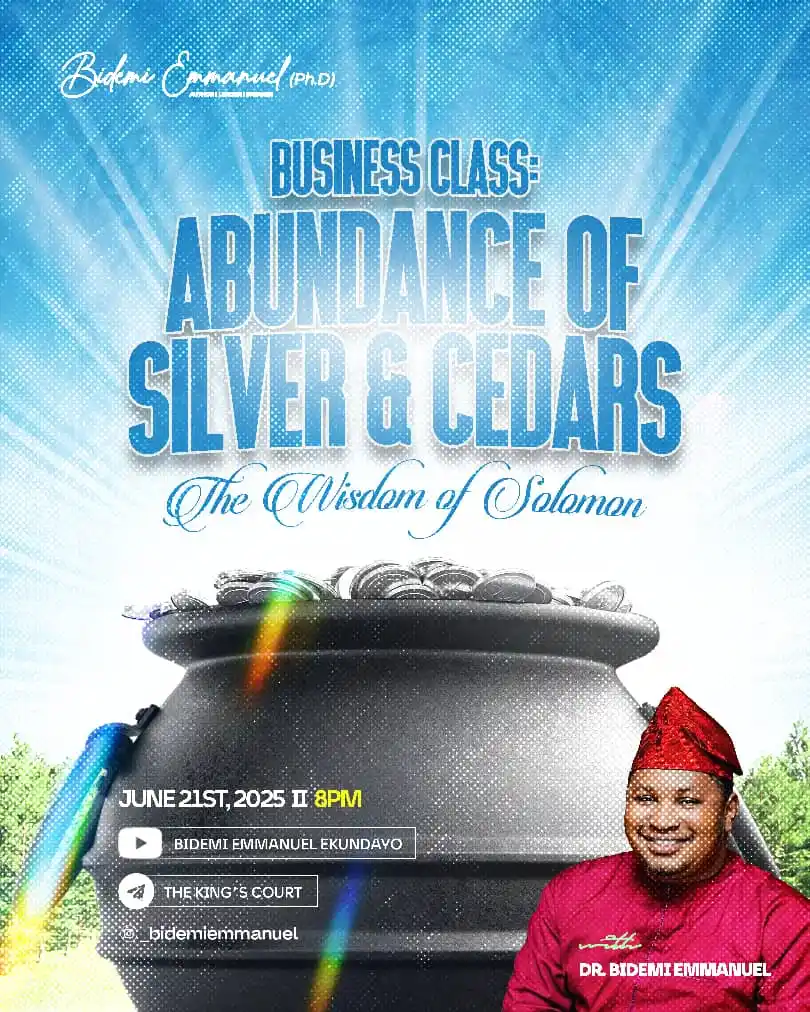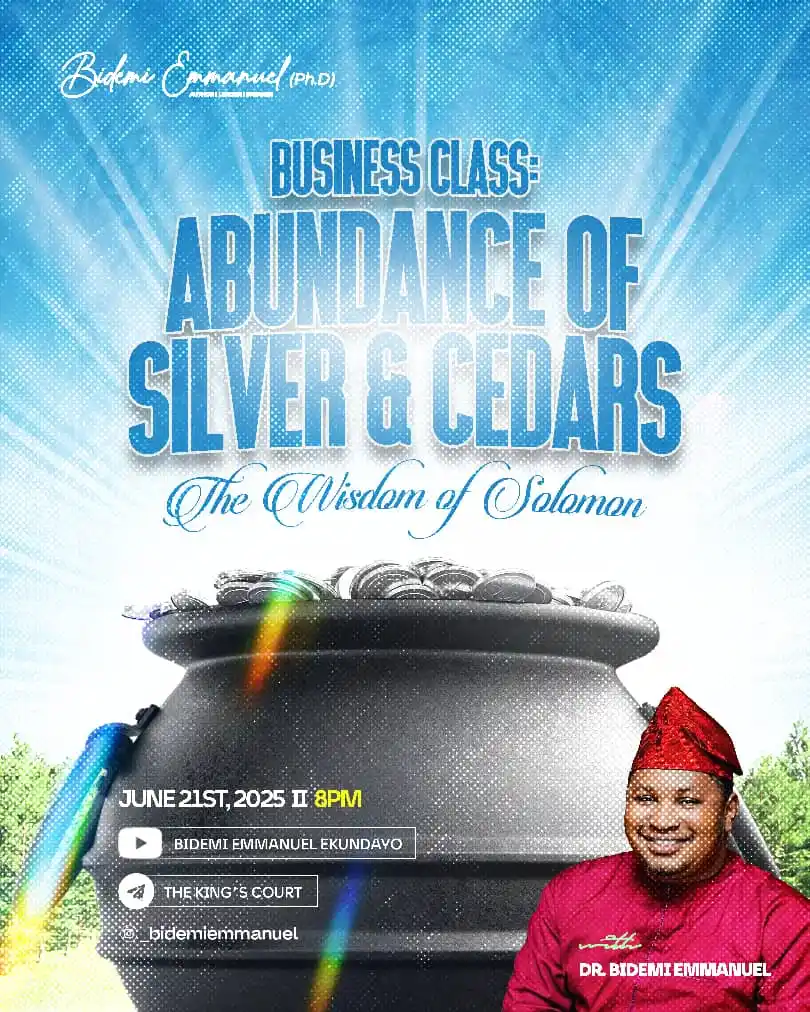
Dr Bidemi Emmanuel Ekundayo
66 subscribers
Similar Channels
Swipe to see more
Posts

"And the king made silver to be in Jerusalem as stones, and cedars made he to be as the sycomore trees that are in the vale, for abundance." Solomon didn’t just inherit and throne; he operated with wisdom that engineered peace and prosperity. His knowledge wasn’t abstract, it was applied. His leadership didn’t enrich only the palace; it transformed an entire nation. Precious things became common. Wealth was not hoarded but structured into the system. That is the kind of strategy we’re unlocking this Saturday at the Business Class. We’ll be exploring time-tested principles that bring peaceful profit, enduring value, and inclusive growth, models that work, and wisdom that scales. Mark your calendar. Invite a friend. Bidemi Emmanuel


*IMPORTANT UPDATE* The request above is for a magazine myself and my team are working to produce very soon it's focused on the "African Woman - the girl child too". I believe we have many here. Hence I'm inviting you to come contribute your quota by submitting an article for publication. I know I have ladies here and I have writers too. Reach out to the number and the email on the broadcast for more information THANKs

Greetings Beloved Keep in mind, tomorrow night by 8pm, we explore the advantage of the believer in Light and superior understanding of human and spiritual endeavour. It promises to be great - feel free to invite as many as you desire Bidemi Emmanuel

it's about that time we have a business and finance talk this is going to be dedicated towards strategies and applications set the alarm Abundance of Silver and Cedars


*📣 CALL FOR ARTICLES – BLACK GOLD MAGAZINE* Are you a passionate writer, storyteller, or thought leader? Do you have a voice that speaks boldly about the strength, resilience, and brilliance of African women? Here’s your chance to be published! Black Gold Magazine is thrilled to announce an open call for article submissions for our maiden edition titled: *“BLACK GOLD: The Mind of Strong African Women”* This edition aims to showcase the power, intellect, struggles, triumphs, and unspoken truths of African women across generations and sectors. Whether you're writing from a personal lens, exploring societal trends, or sharing research-based insights — your voice matters. 📌 Submission Guidelines: • Word Count: 1500+ words • Format: Microsoft Word (.docx), Times New Roman font size 11. • Include: Your full name, email, and affiliation Send to: [email protected] 📅 Submission Deadline: 20th July, 2025 For inquiries, contact Josephine: 📞 08065240945


*📣 CALL FOR ARTICLES – BLACK GOLD MAGAZINE* Are you a passionate writer, storyteller, or thought leader? Do you have a voice that speaks boldly about the strength, resilience, and brilliance of African women? Here’s your chance to be published! Black Gold Magazine is thrilled to announce an open call for article submissions for our maiden edition titled: *“BLACK GOLD: The Mind of Strong African Women”* This edition aims to showcase the power, intellect, struggles, triumphs, and unspoken truths of African women across generations and sectors. Whether you're writing from a personal lens, exploring societal trends, or sharing research-based insights — your voice matters. 📌 Submission Guidelines: • Word Count: 1500+ words • Format: Microsoft Word (.docx), Times New Roman font size 11. • Include: Your full name, email, and affiliation Send to: [email protected] 📅 Submission Deadline: 20th July, 2025 For inquiries, contact Josephine: 📞 08065240945


In preparation for this I'd be offering free business and financial consultancy for anyone and everyone who reaches out from now till Wednesday and also questions about personal finances and business as I'd be attending to them on a live session by wednesday evening – the scope of the question is limited to finance and business Thanks

It is indeed possible to become so familiar with pain that you begin to wear it like a second skin—so accustomed to its presence that you forget what it feels like to live without it. Pain, especially when prolonged or repeated, has a way of dulling the senses, distorting perception, and creating a false identity. You begin to believe that the ache is a permanent part of who you are, that brokenness is your baseline, and that joy, peace, and wholeness are luxuries reserved for others. This is one of the deepest tragedies of unhealed wounds—not just the pain itself, but the gradual loss of hope that healing is even possible. Please don’t settle there. Don’t let pain convince you that it is your final condition. Fight, even if weakly at first, to remember what wholeness feels like—or at least to believe that it’s still within reach. Begin by reclaiming the consciousness of a healed mind, of a heart at peace, of a soul that breathes freely. You may not feel it immediately, but the fight for that awareness is already a step toward freedom. It reminds your soul that pain is not your identity, it’s only an experience, and experiences can change. Never accept pain as a norm. It may have lingered, but it does not define you. And if you’ve already unconsciously made peace with it, it’s time to break that agreement. Cultivate a strong, burning desire for freedom—a desire that refuses to be numbed by resignation. That desire, however fragile at first, will become your compass. It will lead you to truth, to healing words, to helpful people, to divine encounters. And as you follow it, healing will unfold, not always all at once, but in layers, in waves, in deep and lasting restoration. You were never designed to live in chains. There is more—so much more—for you beyond the pain. Bidemi Emmanuel

When a person has experienced repeated falls—whether into sin, emotional traps, harmful habits, or cycles of failure, it is easy to be consumed by guilt, shame, or self-pity. But beyond the tears and brokenness lies a call to wisdom. There is immense power in studying the patterns of one’s downfall. It is not enough to mourn the fall; we must analyze it. What triggered it? What were the warning signs? Who or what surrounded the moment of weakness? What time of day, what emotional state, what location, what thought preceded it? These questions are not to invite condemnation but to uncover knowledge. For in understanding the anatomy of your fall, you gain the insight necessary to walk in lasting victory. More profound still is this truth: what seems like a personal struggle is often a communal one. The patterns that trip you up are not isolated. Many others, silently and secretly, wrestle with the same things. And if you are diligent enough to trace the roots of your struggle, you will find that the solutions you discover are not just for you, they are for others. Your wisdom becomes their deliverance. Your healing becomes their hope. Your knowledge becomes a tool for restoring others. This is the beauty of redemptive living: that your past pain can birth another's present freedom. However, it must be clearly stated that knowledge alone does not save. Introspection is vital, but it is insufficient on its own. Many have wept bitterly over their failures. Many have vowed never to return to the same sins, yet did. Tears, while they express sorrow, do not possess the power to transform. The real deliverance from the sin that so easily besets us is not found in human resolve or emotional regret but in the grace of God. This grace does not merely forgive—it empowers. It strengthens the weak, lifts the fallen, and gives the capacity to live above sin. It is not earned, but it is available. And it is in yielding to this grace, rather than relying on our willpower alone, that we find lasting freedom. Therefore, study your patterns, gain understanding, help others, but above all, lean on the grace that helps all men, for it alone saves most surely and most easily. Bidemi Emmanuel

I assure you—you're not alone in your suffering. Though pain often isolates and convinces us that no one else truly understands, the reality is that many others are walking through similar struggles, even if silently. What you battle is not new. It has been faced before, and it has been overcome. The difference between prolonged pain and lasting healing often lies in the willingness to seek wisdom, study proven solutions, and adapt them with personal sincerity. If you will take the time to examine what has worked for others, especially those who overcame through tested principles, you'll find that those same patterns of deliverance can apply to you as well. With a little adaptation and a humble willingness to personalize the process, freedom is closer than you think. These principles have stood the test of time; they will work again. The challenge with real solutions, however, is that they demand a heart fully given. Many people expect transformation from minimal effort, quick fixes, or emotional spurts of activity. But true change requires consistency. If you’ve tried a method once—or half-heartedly—and it didn’t work, that’s not an indictment on the solution. It’s simply proof that application must be deliberate and sustained. The principle still works. The truth still delivers. The path to healing still exists. But it is those who commit their hearts fully to walking it out who will reap the full result. So don’t discard the solution just because it didn’t yield instant results. Don’t give up on what works simply because you didn’t work it well enough the first time. Go back, give your heart to it, and you’ll find that yes—it does work. Bidemi Emmanuel














